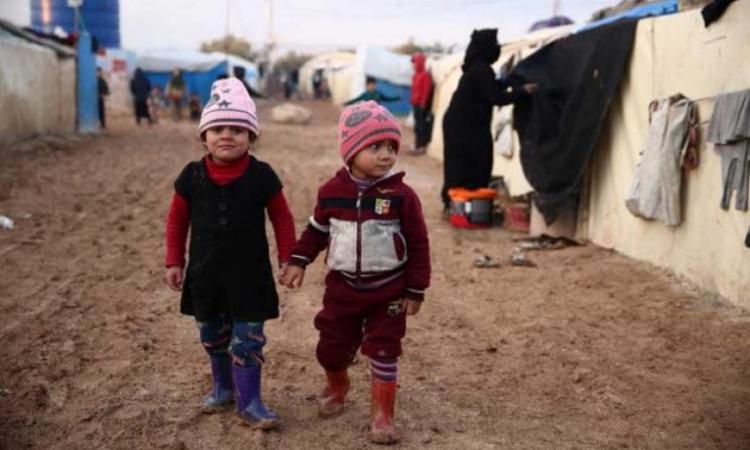Al-Rukban – North-Press Agency
Residents in the al-Rukban camp on the Syrian-Jordanian border warned of a medical disaster that pregnant women who are due to give birth and may need caesarean sections could experience, in the absence of medical points and not being allowed to enter Jordan to receive treatment and conduct surgical operations in neighboring state hospitals.
Imad Abu Sham, a field activist from al-Ghouta in Damascus, who lives in the camp, said: "Nowadays, the medical situation is catastrophic and the most affected are pregnant women who are waiting to have the cesarean section and to be allowed to enter Jordan and receive treatment."
The Closure of the medical point
Caesarean sections were previously performed inside Jordan after women were transferred by the medical staff working at the Aoun medical point, according to Abu Sham.
He added: "However, four weeks ago, that point was closed until further notice, this, in turn, will cause a catastrophic situation for these pregnant women unless it's perceived and health organizations intervene in this matter."
What made the health conditions worse is the absence of doctors from the camp, while relying only on two medical points in the camp, which are "Sham" and "Tadmur", but it lacks equipment and staff, and it's managed by trained nurses.
The field activist pointed out that "some men are considering sending their women to the areas of the Syrian regime to undergo operations, but they fear that they will be arrested because their husbands are wanted by the regime."
A few days ago, the Jordanian Foreign Minister Ayman al-Safadi, stated that his country would not allow aid to enter the al-Rukban camp through its lands, nor would it accept the departure of anyone from inside the camp towards the Jordanian territory.
Aids cut off
Commenting on this, Abu Sham said: "As for Jordan’s statement, humanitarian aid has been cut off for three years from the Jordanian side. Therefore, this statement will not make a difference for the displaced people who reside between the Syrian and Jordanian borders in no man's land.”
He added: "For example, my house is closer to Jordanian outposts, located 200 meters from the Jordanian lands. I cannot enter Jordan nor obtain aid from it. Frankly, we are surprised by Jordan's inhumane behavior towards the camp in terms of not providing aid to the camp."
According to the same source, the al-Rukban camp houses 5,900 people suffering from a catastrophic humanitarian situation, which was exacerbated by the high prices, the monopoly by traders, and the absence of the most basic materials, which if they are available, their prices exceed the camp's residents' capacity to pay, in addition to the absence of aid for many months.
"The humanitarian situation is very miserable because of the continued siege of the Syrian regime since February 9, 2019, as the siege has been more tightened for four weeks, which led to the loss of foodstuffs, the most important of which are flour and sugar," Abu Sham added.
Ramadan and lack of equipment
As Ramadan approaches, Abu Sham expressed the suffering of displaced people by the absence of relief organizations and the absence of any equipment related to iftar and suhur.
"There are no preparations for Ramadan, especially since people are suffering from poor economic situations," he said.
The main market in the camp is witnessing a shortage of many materials, especially vegetables, in addition to the absence of materials for the time of suhur in Ramadan, according to the source.
With the increased tightening of the siege, the camp residents, in previous periods, demanded that the international organizations to provide a way to take them to northern Syria, however, their demands were not heard, which prompted the displaced people to carry out sit-ins protesting against the dire situation in the camp.
International participation
Mudar al-Asaad, the spokesman for the Association of Syrian Refugees, told North-Press: "The absence of UN aid in the camp indicates that there is clear international involvement between them and the Assad [Syrian] regime and Russia in the process of besieging the camp and starving its residents."
He added, "There is a clear shortage inside the camp in tents, relief materials, infant formula and the absence of medical points, after the United Nations closed its medical points in the camp, hence the United Nations and the Arab League bear responsibility for what the camp residents go through."
Al-Asaad called on international organizations to work to bring relief materials through the U.S.-led Global Coalition forces on the ground near the camp at the al-Tanf military base, (the 55km deconfliction zone in al-Tanf garrison in the Syrian Badia).
He also called on Jordan to open one of its gates towards the camp in order to enter ambulances and medical and relief materials, because there are pregnant women and births in need of rapid medical treatment, and children suffering from infectious and communicable diseases, as well as those with chronic diseases such as heart, pressure diabetes, etc., so work must be done to save what can be saved from the camp's residents.
Last week, both the Syrian Red Crescent and the United Nations Office for the Coordination of Humanitarian Affairs (OCHA) attempted to enter humanitarian aid for the camp residents, but the camp's elders rejected that aid because it was very few and not enough to meet the camp’s needs, demanding that it be sufficient for everyone, which prompted the Syrian Red Crescent to return the aid, according to sources inside the camp.
North-Press was unable to know the Red Crescent officials' point of view and find out about the reasons.

